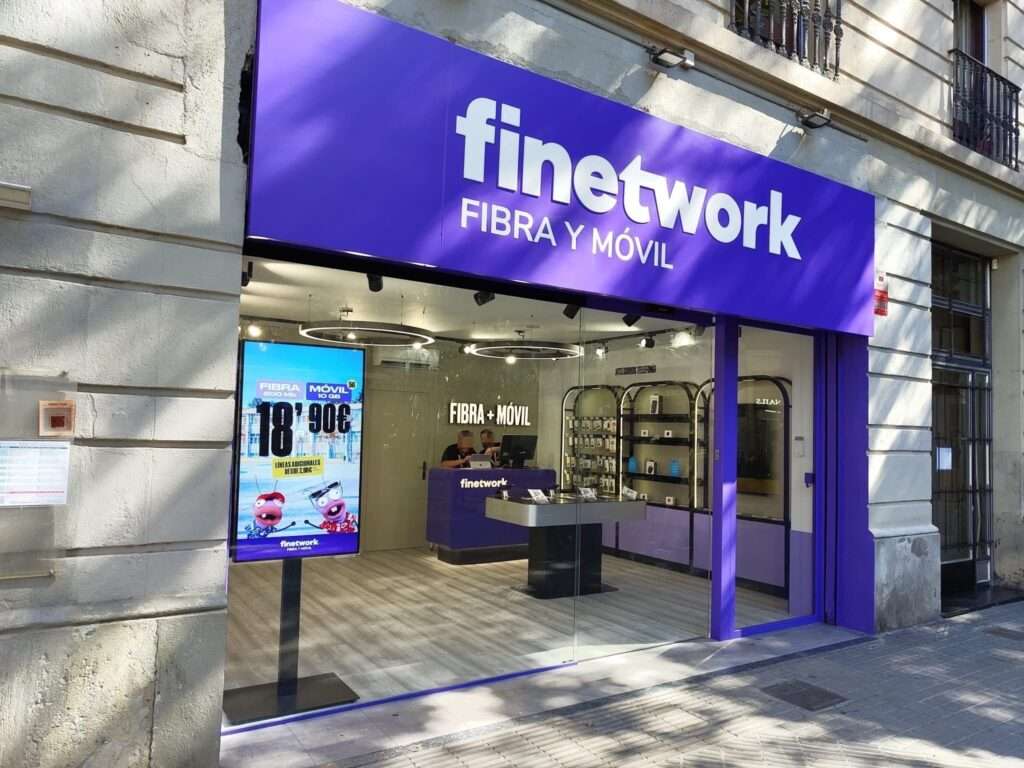The telecommunications market in Spain has experienced a period of heightened tension in recent months concerning the future of Finetwork, the virtual mobile operator (VMO) headquartered in Alicante. After months of legal and financial disputes, the Alicante Commercial Court No. 1 approved the restructuring plan proposed by Vodafone Spain, meaning the British company, controlled by the Zegona fund, will assume majority ownership of Finetwork’s parent company, Wewi Mobile.
This move marks a significant shift in direction for the VMO, which since the beginning of the year was embroiled in a conflict with its network provider, specifically Vodafone, over unpaid bills related to the use of its fiber and mobile infrastructure.
From contractual dispute to shareholding control
The origin of the conflict dates back to early 2024, when Finetwork accused Vodafone of providing subpar service under the wholesale agreement both companies had renewed a few months earlier. The agreement included monetary compensation for serious incidents, prompting Finetwork to claim up to €150 million in damages.
In response, Finetwork stopped paying its network rental invoices, generating a large debt that steadily increased, placing the company in pre-bankruptcy proceedings by May 2025.
As the main creditor, Vodafone requested the appointment of a restructuring expert, which ultimately was assigned to FTI Consulting. The proposed plan involved partial debt capitalization and taking control of the Alicante-based company.
Key points of the court-approved plan
The court order states that Vodafone will control 95% of Wewi Mobile’s shares, granting it the authority to appoint three members to the new board of directors. Additionally, Vodafone commits to injecting up to €20 million in protected financing, ensuring immediate liquidity and prioritizing repayment over other creditors.
Simultaneously, the plan includes debt compensation of €50 million through a capital increase, diluting the founding partners’ stake to just around 10%.
The court’s decision also blocks any sale attempts or corporate movements by the current owners, effectively nullifying the operation Finetwork announced in June with the Asterion fund to sell the company to Olin as a way to escape the crisis.
A future still subject to CNMC and government approval
While the court ruling clears the way, Vodafone’s acquisition is still pending approval from the National Markets and Competition Commission (CNMC) and the Spanish government’s Foreign Investment department.
The reason: Vodafone Spain is controlled by Zegona, a UK-based financial group, whereas Finetwork operates in a sector considered strategic. These approvals are expected within approximately one month.
If approval is not granted before December 31, 2025, the plan would become invalid, although industry sources consider it unlikely that authorities would block a deal ensuring service continuity for hundreds of thousands of customers.
Impact on customers and the market
Vodafone has issued a clear message: the priority will be the “operational stability of Finetwork” and the regular service provision to customers, a group that has expressed concerns in recent months about potential service interruptions or coverage loss due to the financial crisis of the VMO.
This move will also influence the competitive landscape. Finetwork had initially gained market traction through aggressive pricing policies and large-scale advertising campaigns, even hiring ambassadors like Fernando Alonso. Under Vodafone’s control, the brand could become a low-cost subsidiary to compete directly with other budget operators such as Digi, MásMóvil, or Lowi.
A transaction with ripple effects across the Spanish telco ecosystem
The de facto absorption of Finetwork by Vodafone reflects a recurring phenomenon in the telecom sector: the difficulty for virtual operators to survive at scale without backing from a financially robust group with infrastructure control.
In this case, Finetwork’s technological dependence on Vodafone became a double-edged sword. On one hand, it enabled rapid growth by offering competitive fiber and mobile services; on the other, it made the company vulnerable to disagreements with its network provider.
Now, with Vodafone at the helm, the company’s future looks assured, but likely at the cost of losing the independence that characterized it since its founding in Alicante.
Frequently Asked Questions (FAQ)
1. What will happen to Finetwork’s current customers?
According to Vodafone, services will continue normally, with lines and conditions remaining unchanged, without interruptions.
2. When will Vodafone’s control take effect?
It’s expected to occur in about a month, once CNMC and government approvals are obtained, allowing Vodafone to officially take control of Finetwork.
3. What will happen to the Finetwork brand?
While Vodafone hasn’t provided specific details, industry experts suggest it may remain as an independent low-cost brand, akin to Lowi’s role within the group.
4. How does this affect the Spanish telecom market?
It strengthens Vodafone’s position in the sector and reduces the independence of VMOs. At the same time, it intensifies competition in the low-cost segment, where Digi and MásMóvil continue to increase their market share.
via: expansion

